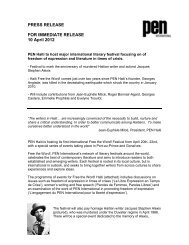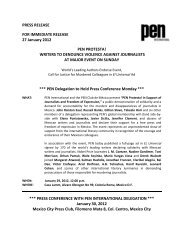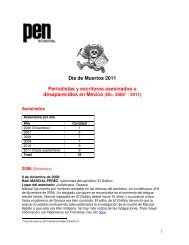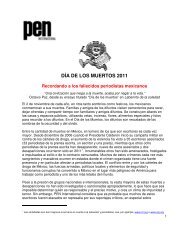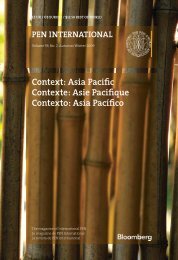Olive Senior - PEN International
Olive Senior - PEN International
Olive Senior - PEN International
You also want an ePaper? Increase the reach of your titles
YUMPU automatically turns print PDFs into web optimized ePapers that Google loves.
Walerian Domanski<br />
Smoke Factories<br />
WORDS ... WALERIAN DOMANSKI 53<br />
In 1955, I sat on the Regional Party Committee of the city of Kielce, as First Secretary<br />
for Economic Affairs. That summer was a hot one; the sky seemed aglow at all<br />
times. One day, my assistant informed me that the Secretariat of the Party Central<br />
Committee in Warsaw was convening an urgent conference, and that my presence<br />
would be required: I had only twelve hours until it began. I immediately informed<br />
my wife and sent for my driver, and for the rest of the day attended only to the<br />
most urgent problems on my desk.<br />
I arrived in Warsaw the following day, and checked into a room that had been<br />
reserved for me at the hotel where the Central Committee meeting was to take<br />
place. It had also been arranged that meals would be served in a special canteen.<br />
I met a few old friends who were also in attendance. We settled down at 10am<br />
for the beginning of the conference, which was led by Jakub Berman, a highranking<br />
member of the Polish Politburo who was known to have Stalin’s trust.<br />
He began the conference in typical fashion – but the topic of our meeting, it turned<br />
out, was not so typical.<br />
‘Comrades,’ Berman began, ‘I am very pleased to welcome you all. The theme<br />
of this conference is the prevention of unemployment.’<br />
Now, with the great achievement of communism came, supposedly, full<br />
employment. In communist Poland we could not refer to the ‘unemployed’, for in<br />
fact no one could be unemployed. Berman emphasised that we could not allow this<br />
chief principle of communism to be disrespected.<br />
Yet Polish production had shown a dangerous tendency to slow down, for<br />
various reasons – sites throughout the country had been informing us that the lack<br />
of materials and orders from abroad were preventing them from having anything<br />
to produce. Our trading partners, including the Soviet Union, China and other<br />
communist countries, were experiencing economic difficulties of their own, and<br />
cutting off orders, especially for consumer goods. We had full order books only for<br />
coal, steel, sulphur, freight cars, ships and military equipment. (The Soviet Union<br />
and China, evidently, were not slowing down defence spending.)<br />
The time had come, Berman exhorted us, to take drastic measures to maintain<br />
full employment. First we considered a transfer of workers from industry to<br />
agriculture, but agriculture was already overstaffed. We wondered if perhaps<br />
sending our workers to foreign countries on international contracts was the<br />
answer, but this idea was rejected as too risky, as workers there might either be<br />
recruited by Western intelligence services or defect entirely. Our Soviet comrades<br />
were also very likely to protest such a notion.<br />
No, we comrades concluded, the only way to solve this problem was to build



